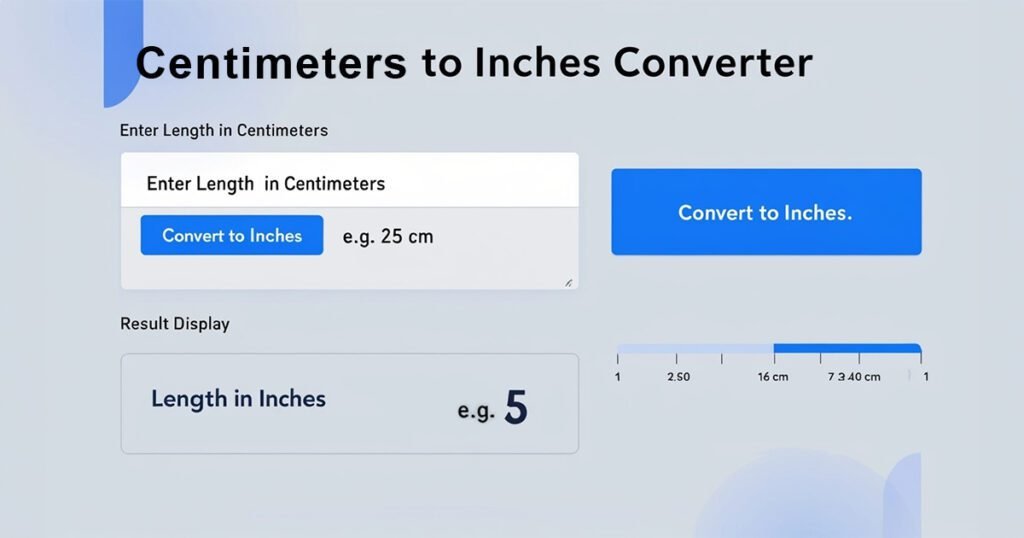Length Converter
Centimeter
Centimeter (cm) or centimetre is a unit of length in the International System of Units (SI). Centi is a prefix for 1/100.
One centimeter is equal to 1/100 of a meter (m).
One centimeter is equal to 10 millimeters (mm).
One centimeter is eqaul to 1/2.54 of an inch (in).
Inch
Inch (in or ″) is a unit of length.
One inch is equal to 1/12 of a foot (ft).
One inch is equal to 1/36 of a yard (yd).
One inch is eqaul to 2.54 centimeters (cm).
How to convert centimeters to inches
1 centimeter is equal to 0.3937007874 inches:
1cm = (1/2.54)″ = 0.3937007874″
The distance in inches (″ or in) is equal to the distance in centimeters (cm) divided by 2.54:
distance(inch) = distance(cm) / 2.54
Example
Convert 20 cm to inches:
distance(inch) = 20cm / 2.54 = 7.874″
How many inches in a centimeter
One centimeter is equal to 0.3937 inches:
1cm = 1cm / 2.54cm/in = 0.3937in
How many centimeters in an inch
One inch is equal to 2.54 centimeters:
1in = 2.54×1in = 2.54cm
How to convert 10cm to inches
Divide 10 centimeters by 2.54 to get inches:
10cm = 10cm / 2.54cm/in = 3.937in
Centimeters to inches conversion table
The fraction inches are rounded to 1/64 resolution.
| Centimeters (cm) | Inches (“) (decimal) | Inches (“) (fraction) |
|---|---|---|
| 0.01 cm | 0.0039 in | 0 in |
| 0.1 cm | 0.0394 in | 3/64 in |
| 1 cm | 0.3937 in | 25/64 in |
| 2 cm | 0.7874 in | 25/32 in |
| 3 cm | 1.1811 in | 1 3/16 in |
| 4 cm | 1.5748 in | 1 37/64 in |
| 5 cm | 1.9685 in | 1 31/32 in |
| 6 cm | 2.3622 in | 2 23/64 in |
| 7 cm | 2.7559 in | 2 3/4 in |
| 8 cm | 3.1496 in | 3 5/32 in |
| 9 cm | 3.5433 in | 3 35/64 in |
| 10 cm | 3.9370 in | 3 15/16 in |
| 20 cm | 7.8740 in | 7 7/8 in |
| 30 cm | 11.8110 in | 11 13/16 in |
| 40 cm | 15.7480 in | 15 3/4 in |
| 50 cm | 19.6850 in | 19 11/16 in |
| 60 cm | 23.6220 in | 23 5/8 in |
| 70 cm | 27.5591 in | 27 9/16 in |
| 80 cm | 31.4961 in | 31 1/2 in |
| 90 cm | 35.4331 in | 35 7/16 in |
| 100 cm | 39.3701 in | 39 3/8 in |
Centimeters to Inches Conversion
Converting centimeters (cm) to inches (in) is a straightforward process. Since 1 inch equals exactly 2.54 centimeters, you can use this conversion factor:
1 inch = 2.54 cm
Length is one of the most fundamental measurements in our daily lives, from measuring distances and heights to dimensions of objects. However, depending on the country or field of application, the units used to express lengths vary significantly. This is where a Length Converter becomes invaluable, enabling seamless conversions between different units of length across various systems such as metric, imperial, and custom units.
A comprehensive length converter tool not only provides quick conversions but also enhances understanding of how different units relate to each other. This post dives deep into the features, functionality, and importance of a length converter.
Why Do We Need a Length Converter?
1. Globalization and Standardization
In today’s interconnected world, people frequently deal with length measurements across diverse systems. For example:
- Metric systems dominate most countries.
- Imperial systems, like feet and inches, are prevalent in the USA. A length converter bridges the gap between these systems.
2. Professional and Technical Use
Fields like architecture, engineering, and construction demand precise measurements. Professionals often need to convert between units such as meters, feet, or inches to suit project requirements.
3. Everyday Applications
From buying fabric in yards to determining road distances in kilometers or miles, conversions are part of daily life.
Features of a Length Converter
A robust length converter should:
- Support All Units: Convert between commonly used and lesser-known units.
- Instant Results: Provide quick and accurate conversions.
- Easy-to-Use Interface: Be intuitive for users with varying levels of technical knowledge.
- Detailed Explanations: Offer insights into how the conversion is calculated.
- Precision Customization: Allow users to adjust the decimal places for greater precision.
List of Supported Units
A good length converter supports the following units, categorized into systems:
Metric Units
- Millimeters (mm)
- Centimeters (cm)
- Meters (m)
- Kilometers (km)
Imperial Units
- Inches (in)
- Feet (ft)
- Yards (yd)
- Miles (mi)
Marine Units
- Nautical Miles (nmi)
- Fathoms (fth)
Astronomical Units
- Light Years (ly)
- Parsecs (pc)
- Astronomical Units (au)
Customary and Regional Units
- Hands (used for measuring horses)
- Chains (used in land surveying)
- Rods (used in old measurement systems)
Conversion Formulas
A length converter tool automates these calculations, but understanding the formulas can deepen your grasp of the underlying logic.
Metric to Metric
- 1 Kilometer = 1000 Meters
- 1 Meter = 100 Centimeters
- 1 Centimeter = 10 Millimeters
Metric to Imperial
- 1 Meter ≈ 3.28084 Feet
- 1 Kilometer ≈ 0.621371 Miles
Imperial to Metric
- 1 Inch = 2.54 Centimeters
- 1 Foot = 0.3048 Meters
- 1 Yard = 0.9144 Meters
Imperial to Imperial
- 1 Yard = 3 Feet
- 1 Mile = 5280 Feet
Astronomical Units
- 1 Light Year ≈ 9.461 x 10¹² Kilometers
- 1 Astronomical Unit ≈ 149.6 Million Kilometers
Detailed Examples
1. Metric to Metric
Convert 5 Kilometers to Meters
Formula:
5 km×1000=5000 m5 \, \text{km} \times 1000 = 5000 \, \text{m}5km×1000=5000mConvert 200 Centimeters to Millimeters
Formula:
200 cm×10=2000 mm200 \, \text{cm} \times 10 = 2000 \, \text{mm}200cm×10=2000mm
2. Metric to Imperial
Convert 2 Meters to Feet
Formula:
2 m×3.28084=6.56168 ft2 \, \text{m} \times 3.28084 = 6.56168 \, \text{ft}2m×3.28084=6.56168ftConvert 10 Kilometers to Miles
Formula:
10 km×0.621371=6.21371 mi10 \, \text{km} \times 0.621371 = 6.21371 \, \text{mi}10km×0.621371=6.21371mi
3. Imperial to Metric
Convert 12 Inches to Centimeters
Formula:
12 in×2.54=30.48 cm12 \, \text{in} \times 2.54 = 30.48 \, \text{cm}12in×2.54=30.48cmConvert 5 Miles to Kilometers
Formula:
5 mi×1.60934=8.0467 km5 \, \text{mi} \times 1.60934 = 8.0467 \, \text{km}5mi×1.60934=8.0467km
Applications of a Length Converter
1. Construction and Architecture
Builders and architects frequently deal with blueprints and dimensions that need conversions between meters, feet, and inches.
2. Travel and Navigation
Converting distances, such as kilometers to miles, is crucial for international travel.
3. Education
Students studying physics or geography often need to convert lengths across different units for problem-solving.
4. E-commerce
Online shopping platforms that sell products internationally often list dimensions in various units.
Common Use Cases
Use Case 1: Fabric Measurement
Imagine you’re shopping for fabric online. The length is given in yards, but you need to know it in meters. Using a length converter:
- Input: 10 yards
- Conversion:
10 yd×0.9144=9.144 m10 \, \text{yd} \times 0.9144 = 9.144 \, \text{m}10yd×0.9144=9.144m
Use Case 2: Astronomical Calculations
A student calculates the distance to a star in kilometers but needs it in light-years. Using a length converter:
- Input: 9.461×1012 km9.461 \times 10^{12} \, \text{km}9.461×1012km
- Conversion:
9.461×1012 km÷9.461×1012 km/ly=1 ly9.461 \times 10^{12} \, \text{km} \div 9.461 \times 10^{12} \, \text{km/ly} = 1 \, \text{ly}9.461×1012km÷9.461×1012km/ly=1ly
Advantages of Using a Length Converter
- Time-Saving: Instantly provides accurate conversions.
- Eliminates Errors: Reduces the risk of miscalculation.
- Universal Application: Supports a wide range of units for various needs.
Example Conversion Table
| Unit | Metric Equivalent | Imperial Equivalent |
|---|---|---|
| 1 Millimeter (mm) | 0.001 Meters | 0.03937 Inches |
| 1 Centimeter (cm) | 0.01 Meters | 0.3937 Inches |
| 1 Meter (m) | 1 Meter | 3.28084 Feet |
| 1 Kilometer (km) | 1000 Meters | 0.621371 Miles |
| 1 Inch (in) | 0.0254 Meters | 1 Inch |
| 1 Foot (ft) | 0.3048 Meters | 12 Inches |
| 1 Yard (yd) | 0.9144 Meters | 3 Feet |
| 1 Mile (mi) | 1609.34 Meters | 5280 Feet |
How to Use a Length Converter Tool
- Select the Input Unit: Choose the unit of the length you have.
- Enter the Value: Input the numeric value of the length.
- Select the Output Unit: Choose the unit to which you want to convert.
- View Results: Instantly see the converted value.


